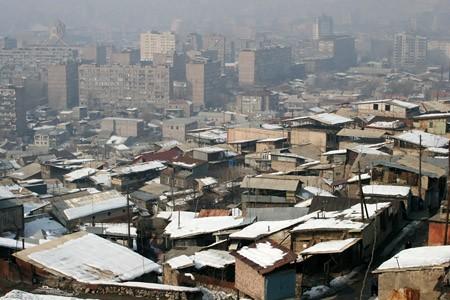
Living without Documents in Sari Tagh
"I repair my house all year round. As soon as I finish one room, something falls apart or peels off in the other room because of the dampness," said twenty-five-year-old Sari Tagh resident Edgar Tonoyan.
As the name Sari Tagh (literally, Hill District) suggests, the houses in this Yerevan neighborhood are built on a hillside. Sometimes one family's roof is another family's yard. During the spring thaw, water from melting snow flows from house to house here, ruining any walls and roofs in its path. "This year's abundant snowfall was not a good thing for us. In the best of times, we barely make ends meet," said Siranush Nersisyan, another Sari Tagh dweller.
Roza Hovhanisyan lives at #14 on Lane 10 in Sari Tagh. Her house is dark and damp. Patches of old wallpaper show through here and there; one of the walls is crumbling. "The wall cracked during the 1988 earthquake. This year, it finally fell apart because of the snow," she said.
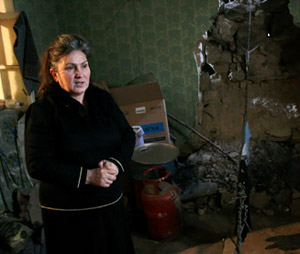 |
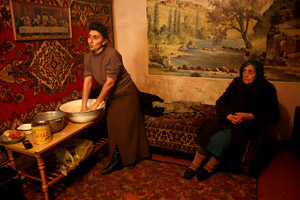 |
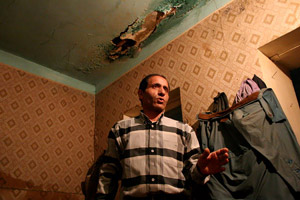 |
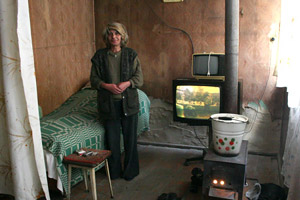 |
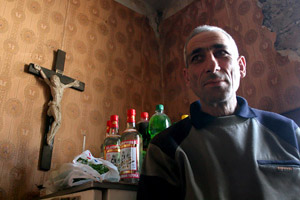 |
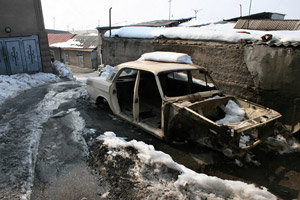 |
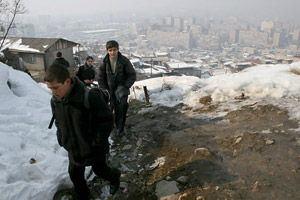 |
Houses in Sari Tagh are as old as those of another Yerevan district, Kond, though unlike Kond, Sari Tagh has a sewer system.
Most of the residents of Sari Tagh do not own the property they live on. "In the past they would register us; now they don't even do that. When they decide to pull these houses down we won't be able to prove that there were nine people living in this little house," Ashot Nazaryan said.
When Roza Hovhanisyan's daughter turned sixteen she was denied registration at her parents' house and as a result she was without a passport for two years. When she turned eighteen she got married and registered at her husband's house.
It has been ten years now since Knkush Gevorgyan bought her "house" in Sari Tagh. She paid $3,000 for the place, which used to be a garage. But Gevorgyan and her son are not the registered owners. Instead, the garage's previous owner has registered her son at his house.
"I had an apartment in Bangladesh (as the South Western district of Yerevan is commonly known). I needed money for my son to have an operation. We sold our apartment and ended up here," Knkush Gevorgyan explained. Her son, who has a second-degree disability, is unemployed. Knkush works in a school, where she earns 20,000 drams (about $44) a month.
Rima Minasyan has five children. She bakes bread at home. She was baking when neighbors called her over to meet with us. She hurried in, her hands floury. All she said was that her husband had died a year ago. The neighbors told us that her mother-in-law had decided to drive the single mother of five out, since she had her children were not registered at the house.
Haykush Sargsyan has two grandchildren, the youngest five months old. "When we pull down the covers to put the children to bed at night, the beds are completely damp," she said. Her husband, Vanya Tonoyan is second-degree disabled.
The head of the Department of Public Services of the Erebuni District Administration, A. Ghazaryan, refused to answer any questions about Sari Tagh. An employee of his department, not wishing to give us his name, explained, "Upon receiving a written request from the resident of a damaged house an expert from the Department of Buildings and Construction goes to take a look at the condition of the house with his own eyes, and then does an analysis of costs and labor which he presents to the head of the local administration. After that, the money will be either allocated from the budget or not, depending on the amount."
The head of the Department of Buildings and Construction of the Erebuni Administration, Levon Karayan, told us that they only dealt with multi-story buildings. But in Sari Tagh, there are only one- and two-story private houses.
The administration chief of staff, Susanna Gevorgyan, added. "We have installed gas lines in the Sari Tagh district, and we have provided some families with gas counters free of charge. But they still complain. It's like they just want to sit there and wait for manna from heaven." She said that houses here are falling apart because of a gradual landslide, not from melting snow, and that it is the government's responsibility to deal with it.
The Depaertment of Information of the Yerevan Mayor's Office informed us that no decision about pulling down or expropriating Sari Tagh has been made yet. Local resident Zhora Hakobyan told us that after the Law on Unauthorized Constructions was adopted, those residents who didn't have new certificates of ownership appealed in writing to legalize their houses. "We have to buy from the state the houses our parents built with their own hands, and pay 5,000 drams per square meter," Roza Hovhanisyan said. Most residents are unable to pay that kind of money, and the passport office won't register new residents in houses that have not been privatized.
Each family in Sari Tagh has its own problems. Many live in extreme poverty and have gotten so used to this way of life that they can't conceive that anything might change in their daily lives. Perhaps we're the only ones alarmed by the state of these old earthen houses, by the smell of dampness, the moldy walls and sodden floors.
Children continue to be born and grow up here even now. The people who live here view the government as distant and inaccessible. They have little hope that their problems might one day be solved.
Arpi Maghakyan
Photos by Onnik Krikorian
 Videos
Videos Photos
Photos
Write a comment